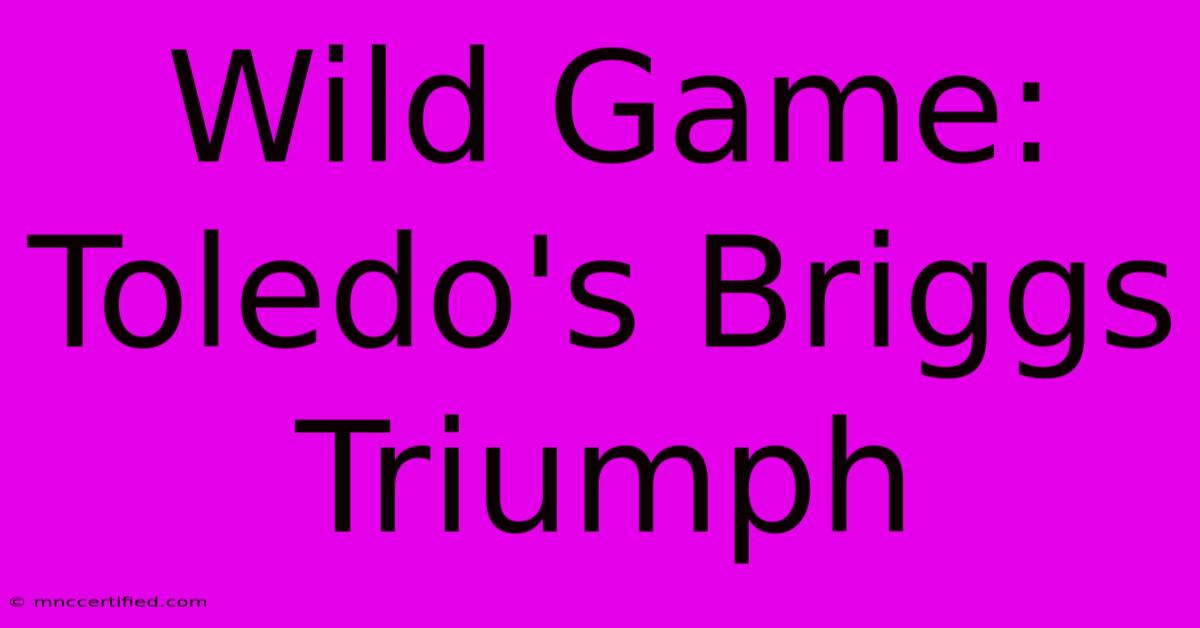Wild Game: Toledo's Briggs Triumph

Table of Contents
Wild Game: Toledo's Briggs Triumph – A Hunting and Conservation Story
Toledo, Ohio, isn't the first place that springs to mind when discussing wild game hunting. Yet, nestled within its urban sprawl and surrounding areas, a rich hunting heritage thrives, particularly highlighted by the success of the Briggs family and their commitment to conservation. This article delves into the story of the Briggs Triumph, illustrating how responsible hunting contributes to wildlife management and the preservation of natural habitats in and around Toledo.
The Briggs Legacy: Generations of Hunters and Conservationists
The Briggs family's involvement in hunting in the Toledo area spans generations. Their story is not just about bagging game; it’s about a deep respect for nature and a commitment to sustainable hunting practices. They exemplify the responsible hunter, actively participating in conservation efforts and advocating for ethical hunting regulations. This dedication has earned them respect within the hunting community and beyond.
Responsible Hunting Practices: The Cornerstone of the Briggs Approach
The Briggs family's success isn't accidental. It's a testament to their understanding and implementation of responsible hunting practices. These include:
- Strict adherence to hunting regulations: They meticulously follow all state and local hunting laws, ensuring they hunt legally and ethically. This includes obtaining the necessary licenses, respecting bag limits, and adhering to season restrictions.
- Understanding wildlife management: The family actively participates in initiatives aimed at managing wildlife populations. This could involve habitat restoration projects, contributing to wildlife surveys, or supporting organizations dedicated to conservation.
- Ethical hunting techniques: They prioritize clean kills, ensuring minimal suffering for the animals they harvest. This respect extends to proper field dressing and the utilization of all harvested game.
- Conservation efforts beyond hunting: The Briggs family’s commitment goes beyond just the hunt. They actively support land conservation efforts, advocating for the protection of vital wildlife habitats around Toledo.
Wild Game in the Toledo Area: A Surprisingly Diverse Ecosystem
While Toledo is known for its urban landscape, the surrounding areas provide surprisingly diverse hunting opportunities. The Maumee River watershed, nearby wetlands, and state wildlife areas offer habitats for a range of game animals, including:
- Deer: White-tailed deer are prevalent in the region, making deer hunting a popular activity.
- Waterfowl: The wetlands provide excellent habitat for various waterfowl species, offering exciting opportunities for duck and goose hunting.
- Small game: Rabbits, squirrels, and other small game are also abundant, providing opportunities for hunters of all skill levels.
These hunting opportunities are crucial for maintaining a balanced ecosystem. Responsible hunting helps regulate populations, preventing overgrazing and ensuring the health of the overall environment.
The Briggs Triumph: More Than Just a Hunt
The Briggs family's success in hunting is a reflection of their deep understanding of the natural world and their unwavering commitment to ethical hunting and conservation. Their story serves as an inspiration, demonstrating how responsible hunting can contribute to the preservation of wildlife and natural habitats, even in an urban environment like Toledo. This “Triumph” isn't just about the game bagged; it’s about the legacy of responsible stewardship left behind.
Conclusion: Celebrating Conservation Through Hunting
The Briggs family story highlights the crucial role responsible hunters play in wildlife management and conservation. Their dedication showcases that hunting and conservation are not mutually exclusive; indeed, responsible hunting can be a vital tool for preserving biodiversity and the health of our natural ecosystems. Their success serves as an example for hunters in Toledo and beyond, emphasizing the importance of ethical practices and a commitment to the long-term well-being of our natural world. By understanding and implementing responsible hunting practices, we can ensure the future of wild game and the enjoyment of hunting for generations to come.
Keywords: Toledo hunting, Briggs family, wild game hunting, Ohio hunting, conservation, responsible hunting, wildlife management, hunting ethics, Maumee River, deer hunting, waterfowl hunting, small game hunting, sustainable hunting, Toledo wildlife, ethical hunting practices, conservation efforts, habitat preservation.

Thank you for visiting our website wich cover about Wild Game: Toledo's Briggs Triumph. We hope the information provided has been useful to you. Feel free to contact us if you have any questions or need further assistance. See you next time and dont miss to bookmark.
Featured Posts
-
Liverpool Dominates Leicester 3 1
Dec 27, 2024
-
Everton Vs Man City Result And Fan Reaction
Dec 27, 2024
-
Jim Larranaga Announces Retirement
Dec 27, 2024
-
Understanding Boxing Day Traditions
Dec 27, 2024
-
Man City V Everton Premier League Preview
Dec 27, 2024